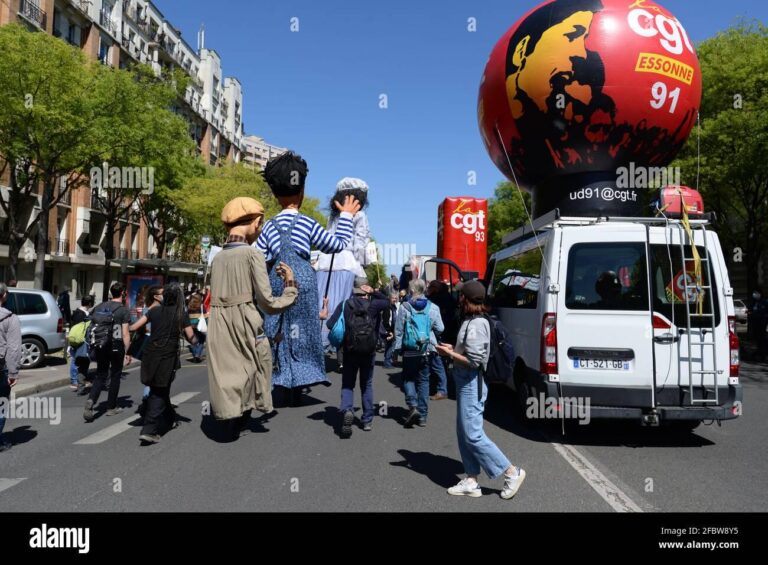France’s prominent entertainment union, CGT-Spectacle, is poised to officially endorse the ongoing strike at the Cannes Film Festival, marking a significant escalation in the labor unrest gripping the event. As deadlines approach and festival activities face disruption, the union’s backing signals heightened solidarity among festival workers and raises the stakes for organizers negotiating demands on working conditions, wages, and industry reforms. The move underscores broader tensions within France’s cultural sector, where unions continue to leverage high-profile platforms to press for systemic change.
France’s Major Entertainment Union CGT-Spectacle Signals Support for Cannes Strike
The CGT-Spectacle, one of France’s premier entertainment unions, has officially declared its intention to back the ongoing strike at the Cannes Film Festival. This move marks a significant escalation in labor tensions amid the prestigious event, emphasizing the union’s commitment to defending workers’ rights in the entertainment sector. The union’s endorsement is expected to bring substantial solidarity from its members, potentially amplifying disruptions throughout the festival’s schedule. Key demands include better working conditions, improved wages, and stronger protections for contract workers in the industry.
Support from CGT-Spectacle spotlights several critical grievances among festival staff and performers, which align closely with broader national labor movements. Organizers have highlighted the following union priorities:
- Fair compensation: Addressing wage disparities in temporary and gig-based roles.
- Workload management: Ensuring reasonable hours and rest periods, especially during peak festival days.
- Contract security: Advocating for longer-term contracts to reduce job precarity.
| Issue | Current Status | Union Demand |
|---|---|---|
| Wages | Below sector average | Increase by 20% |
| Working Hours | Up to 12 hrs/day | Max 8 hrs/day |
| Contract Length | Short-term gigs | Minimum 6-month contracts |
Union Leaders Outline Core Demands Driving the Cannes Protest
Union Leaders have publicly detailed the primary issues fueling the ongoing unrest at Cannes, underscoring demands aimed at securing sustainable labor conditions and fair compensation within France’s entertainment sector. Central to their agenda is the push for improved wage agreements reflecting the rising cost of living, as well as enhanced protections against precarious employment contracts that have increasingly characterized the gig economy in audiovisual and live performance industries.
The union’s platform also emphasizes urgent calls for comprehensive social benefits, including healthcare access and pension reforms tailored specifically for cultural workers. Their outlined demands include:
- Guaranteed minimum wage increases linked to inflation benchmarks
- Stricter regulations to prevent exploitation of freelance talent
- Expanded unemployment coverage for intermittent workers
- Investment in workplace safety standards on set and in venues
| Demand | Current Status | Union Goal |
|---|---|---|
| Minimum Wage Adjustment | Static since 2022 | Annual inflation-linked increases |
| Contract Regulations | Weak enforcement | Enhanced oversight and penalties |
| Unemployment Benefits | Limited to full-time workers | Inclusive intermittent coverage |
| Workplace Safety | Varied compliance | Uniform safety protocols nationwide |
Impact of the Strike on the Cannes Film Festival and Industry Stakeholders
The ongoing strike movement, now backed by France’s influential entertainment union CGT-Spectacle, has sent ripples through the annual Cannes Film Festival, fundamentally challenging its execution. With thousands of technical and creative professionals committed to halting work, many screenings and premieres face potential delays or cancellations, risking the festival’s reputation as a global cinematic hub. Industry stakeholders are grappling with the implications, as logistical uncertainties threaten scheduled events and contractual obligations, putting immense pressure on organizers to find rapid resolutions.
Key stakeholders impacted include:
- Film distributors: Facing delays in promotional activities and release schedules.
- Festival organizers: Confronted with operational disruptions and diminishing audience experience.
- Local businesses: Hotels, restaurants, and vendors anticipating reduced patronage during the festival.
- International delegates: Experiencing logistical challenges and altered networking opportunities.
| Stakeholder | Primary Impact | Potential Outcome |
|---|---|---|
| Film Distributors | Promotion delays | Reduced box office traction |
| Festival Organizers | Operational setbacks | Event rescheduling |
| Local Economy | Lower visitor spending | Revenue losses |
| Artists and Filmmakers | Networking hurdles | Missed opportunities |
Strategies Recommended for Negotiating a Swift Resolution to the Dispute
To expedite a resolution to the escalating dispute, key stakeholders are advised to engage in immediate, transparent dialogue with union representatives. Establishing a dedicated mediation panel comprising neutral industry experts can provide balanced perspectives and foster constructive solutions. Proposals for temporary compromises on contentious issues, such as work schedule adjustments and enhanced safety protocols, could also serve as confidence-building measures to reduce tensions swiftly.
- Initiate roundtable discussions involving union leadership and studio executives
- Employ professional mediators to facilitate negotiations
- Offer phased implementation of union demands to allow gradual adaptation
- Increase transparency on financial impacts to align expectations
- Set clear deadlines for each negotiation stage to maintain momentum
| Strategy | Expected Impact | Timeframe |
|---|---|---|
| Mediation Panel Creation | Neutral dispute resolution | 1 week |
| Phased Demand Implementation | Reduced resistance | 2-4 weeks |
| Enhanced Communication Channels | Trust building | Immediate |
| Clear Negotiation Deadlines | Higher accountability | Ongoing |
Aligning both sides through a strategic blend of structured negotiation and tactical concessions will be critical. The union’s readiness to strike before Cannes, a pivotal moment on the global entertainment calendar, underscores the urgency. Therefore, swift mobilization of all conflict resolution mechanisms and mutual willingness to compromise will be essential to prevent prolonged disruption and protect industry interests.
Key Takeaways
As the CGT-Spectacle union prepares to formally endorse the Cannes strike, the unfolding labor dispute promises to significantly impact France’s entertainment industry and the prestigious film festival alike. Stakeholders across the sector will be closely watching how this endorsement influences negotiations and the broader push for improved working conditions. The situation remains fluid, with potential ramifications for festival programming and the future dynamics of labor activism in French cultural circles.




